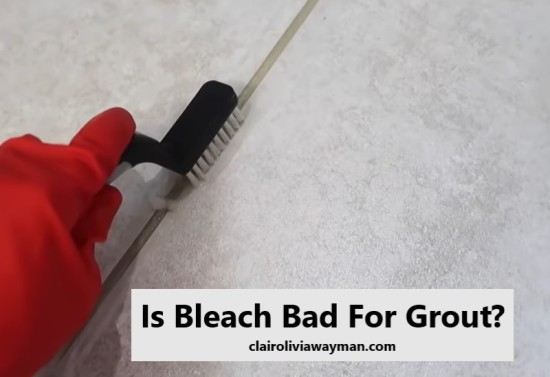Bleach has a significant disinfection effect due to the combination of an active component known as sodium hypochlorite. In microorganisms, this component can alter and eliminate their proteins.
Additionally, it allows Bleach to be a viable alternative for destroying certain bacteria, fungus, and viruses.
As I know, some people even use bleach for cleaning the stubborn stains off the grouts, while others doubt the efficacy of bleach on this surface. However, is bleach bad for grout? Follow me to check this article for the answer!

Table of Contents
Is Bleach Bad For Grout?
From my experience, using bleach to treat stains on grout is not a suitable method because Bleach can trigger health issues on users, damage the tiles’ surfaces, etc., leading to mountain expenses. So, bleach is bad for grout.
What Are The Reasons For Not Using Bleach For Grout?
As I mentioned, bleaching is not suitable for the grout stain treatment. Here are the top 5 reasons explaining why bleaching is the last thing to do to grout:
1. Bleach Is Hazardous To The Skin
Bleach is the last thing on earth you want to play around with because even a tiny quantity of Bleach on your skin surface can trigger severe rashes, burns, and other skin problems. When you clean with bleach, you’re putting yourself in danger.
Furthermore, when you live in a house with children or pets, I can say that you are putting them in great danger whenever you apply Bleach to your grout.
2. Metals Erode When Contacting With Bleach
If you accidentally splash bleach on a neighboring metal fixture while cleaning the grout in your kitchen or bathroom, it won’t end so well in that fixture. Metal is susceptible to bleach and will erode or rust nearly instantly.
Even worse, if you don’t detect your error and the bleach sits on the metalwork, it would further erode the fixture, resulting in higher replacement expenses. I was in this situation when I had to have my shower replaced due to corrosion.
3. Bleach Doesn’t Wipe Out Mold
Let me guess, one of several main reasons to cleanse your grout is to prevent mold and other biological types of debris from growing there and discoloring it, as well as causing a plethora of other issues.
Although you may believe that bleach is the most effective approach to combat mold development, I have to say that you are incorrect: bleach does not destroy mold; it only bleaches it! Not only can mold survive through bleaching, but it will also appear to be gone, hypnotizing you into a false sense of safety!
4. Bleach Can Destroy Your Materials Gradually
Regarding applying Bleach, whether you’re washing in between exquisite tiles or scouring at the grout areas around a magnificent porcelain fixture, the destruction you’re not noticing might be the scariest possibility of all.
As I mentioned, Bleach is corrosive and sensitive; it may progressively degrade the protective coatings of the objects it gets into contact with, such as tile surfaces, protective ceramic coats, wood treatments, and other things.
Your materials will deteriorate to the point where they can no longer be repaired and must be replaced entirely, requiring you additional money to maintain your house looking fantastic.
5. Bleach Easily Dilutes In Water
As far as I can tell, Bleach is strong at first, but it can easily dilute with almost anything, even water. This implies that the more time you spend bleaching on the grout, the less powerful it will become.
Final Thoughts
We have discovered so far that bleaching grout can cause skin problems and destroy the tile and metal surfaces. So my answer to the question “Is bleach bad for grout?” is a big No.
Otherwise, it would be best to consider natural treatments, such as vinegar and lime juice, to apply on the grout lines.
Related Post:
- You Want to Kow: Is Regrouting Worth It?
- How To Clean Dog Urine From Tile Grout – Get Rid Of Stain And Smell
- Get the Right Answer: How Long Does Grout Take To Dry?
- How To Clean Unsealed Grout – A Guide With Easy Methods, And Tips

